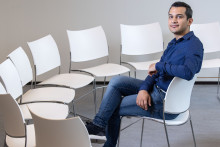Alireza Ghasemi
PhD research topic: The application of machine learning algorithms in combustion modeling and control
Work: PhD candidate at the Thermal Engineering group at the Faculty of Engineering Technology of the University of Twente, working on the MAGISTER project defined within the Marie Sklodowska Curie Actions Innovative Training Networks
Education: Master’s degree in Energy Engineering, Polytechnic University of Milan
Originally from: Iran
‘Everyone in my family wondered if I would become a doctor – but a medical doctor like my parents. It was expected, but I was much more interested in engineering. For some reason, I felt confident that I could do it and do it well. I was fascinated by mathematics and problem solving. I loved the idea of being able to explain the world through math. And I’m very happy I went down that path.
'Doctoral degree was not the gold star I was after’
I’m originally from Teheran. Getting into university in Iran is very difficult, and so I was thrown into the competitive academic environment early on. As is the trend, I left my home country after getting my bachelor’s degree in search of other opportunities and studied in Italy. I definitely wasn’t sure if I wanted to do a PhD, even though my friends all joked that I was certain to do it, that I was the type for it. I was always interested in the “why” questions and focused on technical details. But a doctoral degree was not the gold star I was after. I was looking for an exciting challenge that would also financially support me. Eventually I came across the Marie Curie project at the UT – and was in shock when I was invited for an interview.’
‘My PhD research focuses on turbulent flow and the simulation of the combustion phenomenon. It is part of the MAGISTER project, a large European project which aims to make jet engines greener. There have been many efforts to make jet engines more sustainable, but that often leads to making them more unreliable and prone to damage – which is exactly what you don’t want. The problem lies in thermal acoustics instability which can destroy the integrity of the engine.
It has been a very expensive exploration, and so we should be able to predict the phenomenon before building new engines. In my research I’m therefore applying machine learning for optimization of jet engines. It’s exciting to think that we might be able to solve the same old engine instability using new technologies. The project employs PhD researchers across Europe and together we have designed, built, and tested a new jet engine. During the simulations, I realized that we were producing a ton of data which was difficult to make sense of, which is how I landed on machine learning and why I developed my own software to use for these purposes.’
‘My PhD experience has been an interesting ride. I have learnt a lot, which was the goal. That being said, I’m potentially interested in a career outside of academia. A lot of PhD candidates yearn for a job in a place that mimics their PhD environment, because it is an environment that is easy to fall in love with. Science is all about exploration and being open about its doubts, but industry wants straight answers and quick results. That can be a challenge, but academic life has its own quirks and difficulties. I see this hyper specialization in the academic world. We go very deep into every single topic, but in that process, we detach ourselves from the body of society. I think it’s important for more eyes to see your work. You almost never see academics with a sizeable social media presence, because we are expected to stay in our own field, but I believe we should go to society, not expect them to come to us. Let’s face it, if you make a podcast or a blogpost, you will get a magnitude more views than if you publish in the most prestigious journal.
The main advice I’d like to pass on is: a PhD is not just a title; it's a canvas for personal growth, a path towards mastering both the subject and yourself. Social life was a challenge during my PhD journey. You have to make a conscious effort to join activities, meet people, go out. This is difficult when you feel overwhelmed by work, and it’s often neglected among PhDs even though having a healthy social life is vital for your wellbeing. I had to put a lot of energy into this. I actually had to organize events and then convince people to join them. I hosted organized coffee breaks and always brought cookies. I tried really hard because I value the interaction with others.
'There is a world outside of academia and you should live in it’
As a doctoral candidate, you quickly learn that 24 hours a day isn’t enough to do your job, but you should still do things on top of your PhD. Learn the language, take courses to enhance your soft skills, meet friends. Many people dismiss this because it is not part of their research, but you should not be married to your PhD research. There is a world outside of academia and you should live in it. You are not your PhD.’







